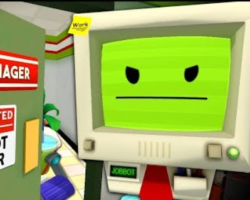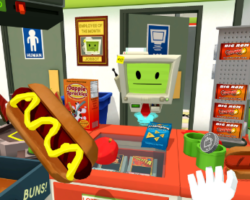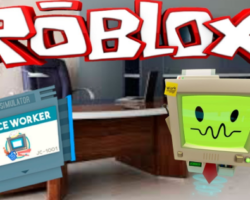Advertisement
Supermarket Simulator

Supermarket Simulator is a first-person management game where the player runs a small grocery store. The goal is to build a successful business by handling every aspect of daily operations, from stocking shelves to checking out customers. The game focuses on realism and gradual growth, offering a detailed simulation of retail activity. Players begin with limited resources and a small space, and must learn how to manage inventory, organize products, and serve customers efficiently. Over time, the store expands through player decisions and reinvestment.
Daily Operations and Player Tasks
Each in-game day involves multiple responsibilities. Players must order stock through a digital interface, receive deliveries, scan items at the register, and respond to customer behavior. The pace of the game is shaped by how well the player balances these tasks. Empty shelves lead to missed sales, while slow checkout times can frustrate shoppers. The player is also responsible for keeping the store clean and organized. These tasks may seem simple at first, but they require multitasking and planning as the business grows.
Key Systems and Progress
The core mechanics of Supermarket Simulator revolve around careful scheduling and resource allocation. Every product has a cost, shelf life, and demand level. Choosing the right mix of goods is essential to maintain profit and avoid waste. As players develop their store, new tools and upgrades become available, such as expanded shelving, storage areas, and checkout systems.
Main gameplay systems include:
- Manual restocking of shelves based on delivery orders
- Scanning and bagging items at the register
- Tracking customer preferences and shopping patterns
- Investing in equipment upgrades to improve efficiency
- Managing prices and product categories to control profit margins
Expansion and Customization
As the store becomes more profitable, players can unlock new areas and improve the layout. The game allows for rearrangement of shelves, placement of signage, and selection of product types. This customization adds a creative layer to the management system. Players may choose to specialize in certain categories, like produce or frozen goods, or aim for a balanced inventory. The store layout also affects customer behavior, making strategic design decisions a key factor in success.
Simulation and Player Experience
Supermarket Simulator is structured around routine but requires constant attention to detail. It offers a steady challenge through increasing demand and the need to optimize workflow. The game does not rely on time pressure but instead rewards thoughtful decision-making and efficiency. While the setting is grounded in daily life, the satisfaction comes from turning a simple store into a thriving operation. The progression is measured in small achievements, like improved customer flow or faster service, making each session a step toward building a more capable business.
Advertisement






















































































Comments